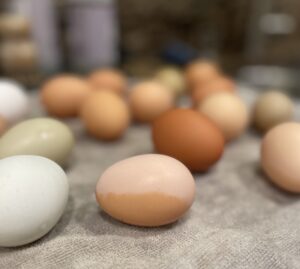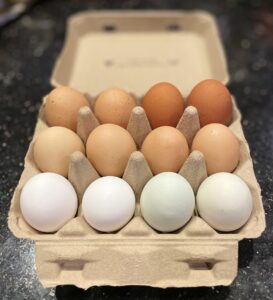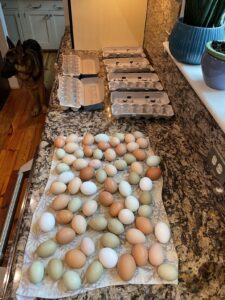Cracking the Debate: To Wash or Not to Wash Freshly Laid Eggs
Are you wondering whether to give your freshly laid eggs a wash or leave them as they are? The debate on whether to wash eggs straight from the nesting box is an intriguing one. In this blog post, we delve into the reasons, considerations, and potential impact of this decision on egg quality and safety.
Egg Bloom

An egg bloom, also known as the cuticle or bloom, is a natural protective coating found on the surface of a fresh egg. It is a thin, transparent layer that seals the pores of the eggshell, helping to maintain its freshness, protect against bacteria and prevent moisture loss. Some eggs have heavier blooms than others which will sometimes change the color of the egg when washed.
How to Store Unwashed Eggs
If you purchase eggs from a local farm, it’s important to know whether the eggs are washed or unwashed. Knowing this information will determine how the eggs need to be stored.

I spent most of my life eating store bought eggs that had to be refrigerated. When I first started raising poultry I washed all of my fresh eggs and refrigerated them. It took me a few months to discover the delight of a fresh, unwashed egg straight from the nesting box. Now, I store all of my fresh eggs on my kitchen counter using this skelter. I can use the skelter because the eggs are removed from the nesting boxes and not washed. You may notice that I store the eggs with the pointed end down. This helps to maintain the air cell at the larger end of the egg, which can help prolong freshness. If an egg is cracked, however, the egg goes into the compost and is not consumed for fear of contamination.
Lifespan of an Unwashed Egg
When unwashed eggs are handled and stored properly, they can last for several weeks to a few months. The shelf life of unwashed eggs is generally longer compared to washed eggs because the natural protective bloom on the shell helps to seal the pores and protect against bacteria and moisture loss. Eggs don’t last long in our house, so I can’t attest to the fact that they last months. However, performing the float test is always a good method to check for egg freshness. To perform the float test, place the egg in a bowl of water—if it sinks to the bottom and lays flat, it is fresh. If it stands upright or floats, it may not be fresh and should be discarded (composted for us). This test can be performed with washed or unwashed eggs. I’ve recently read that unwashed eggs can last in the refrigerator for 3-6 months, if stored properly (see below for more information on proper refrigeration storage).
How to Store Washed Eggs

If you decide to wash your freshly laid eggs or you purchase washed eggs from the store or a local farm, you will need to refrigerate them because washing the egg removes the bloom which allows bacteria and moisture to enter the egg. Refrigeration will suppress bacterial growth and preserve the egg. Place the washed eggs in the refrigerator as soon as possible after washing. The refrigerator temperature should be set at or below 40°F (4°C). Store the washed eggs in a clean and covered container. This helps to protect them from absorbing odors from other foods and prevents moisture loss. Avoid excessive moisture exposure to the eggs as it can compromise their quality. Store them away from areas in the refrigerator where condensation may occur. Store the unwashed eggs with the pointed end down.
Lifespan of a Washed Egg
If washed eggs have been handled properly, they should last for several weeks in the refrigerator. If you’re unsure about the freshness of a washed egg, you can perform the float test (see above for details). It’s worth noting that the storage duration can vary depending on factors like the freshness of the eggs before washing, the storage conditions, and local regulations. Always check the expiration date or recommended consumption guidelines provided by the egg producer. If purchasing from a local farm, know the date the eggs were laid and how they’ve been handled (washed or unwashed). I mark each of my egg cartons with a “laid on” tag so my egg customers know the age of the eggs.
How to Wash Eggs

It is crucial to wash your eggs before using them so you do not contaminate your food with dirty bedding/feces. Some people like to use warm water and a mild detergent specifically designed for egg washing, and then dry the eggs thoroughly afterwards. I do not like using soap for fear of the soap seeping into the egg after the bloom is removed. When washing eggs, I use warm water and scrub lightly if they’re dirty.
The Decision is Yours
The decision of whether or not to wash eggs comes down to personal preference. Washing eggs can remove the protective bloom, increasing the risk of bacterial contamination and reducing their shelf life. However, if the eggs are visibly dirty, proper washing techniques can help maintain cleanliness. Alternatively, leaving unwashed eggs in their natural state, with the protective bloom intact, can help preserve their freshness and quality. Ultimately, practicing proper egg handling, storage, and adhering to local food safety guidelines are key to ensuring the safety and enjoyment of your eggs, regardless of whether you choose to wash them or not.

